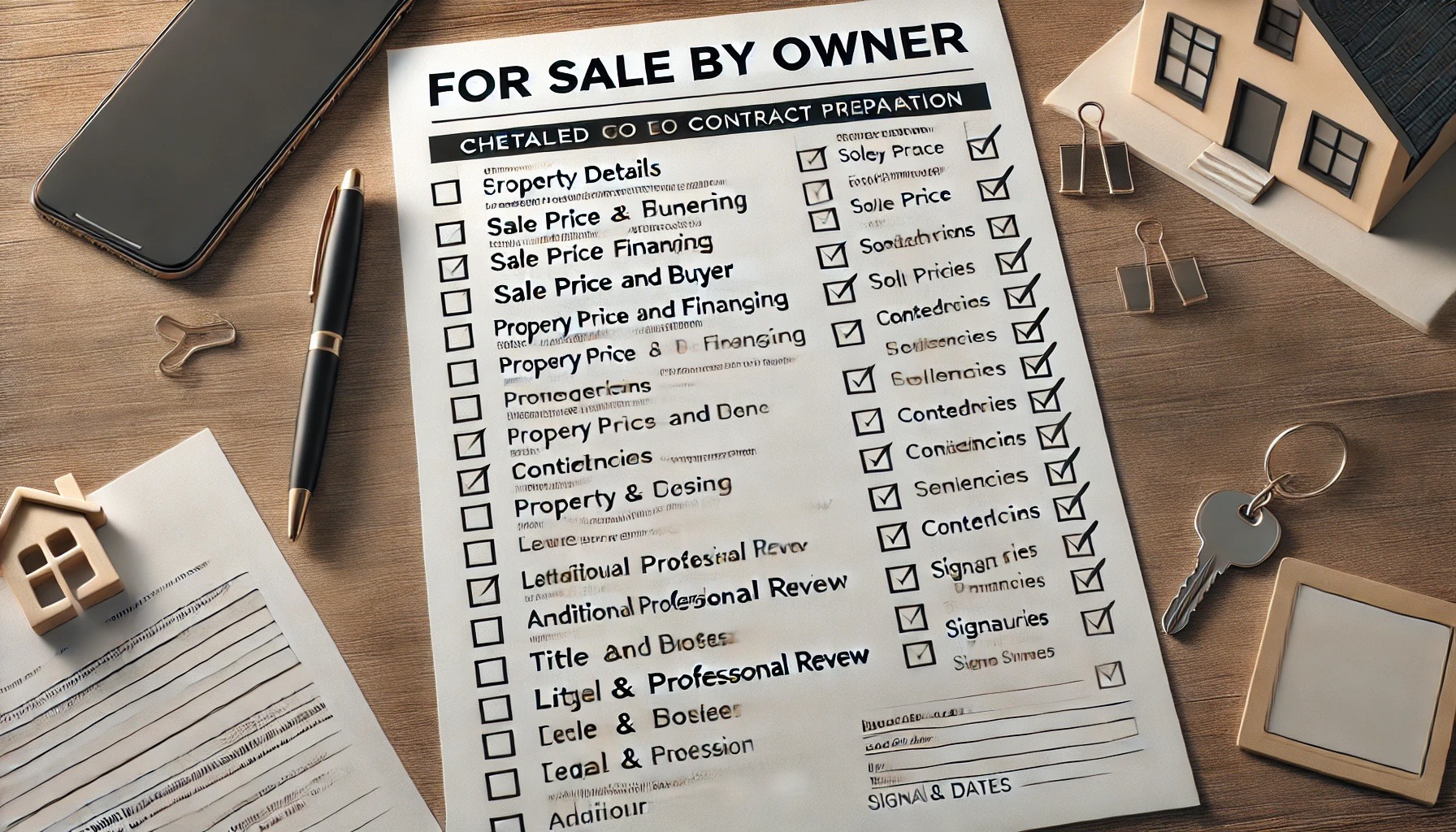Key Highlights
- FSBO Explained: Selling your home without a real estate agent to save on commissions and have more control.
- Contract Drafting Options: Seller, Buyer, Real Estate Attorney, or Real Estate Agent.
- Essential Contract Components: Property details, sale price, closing date, contingencies, earnest money, title and survey, disclosures, prorations, and signatures.
- Legal Considerations: Comply with state-specific requirements, consult a legal professional, fulfill disclosure obligations, and document all amendments.
- Drafting Steps: Research, draft, review, negotiate, and finalize the contract.
- Common Mistakes: Avoid incomplete information, ignoring legal requirements, lack of professional review, poor communication, and failure to document amendments.

Who Draws Up a Contract for a For Sale By Owner (FSBO) Home Sale?
Selling your home without the help of a real estate agent, commonly known as For Sale By Owner (FSBO), can be a rewarding but challenging endeavor. One of the critical steps in this process is drawing up the sales contract. This document legally binds the buyer and seller and outlines the terms and conditions of the sale. But who is responsible for drafting this crucial contract? In this comprehensive guide, we’ll explore the different parties who can draw up the contract in an FSBO transaction, the essential components of the contract, and the legal considerations you need to keep in mind.
Executive Summary
This guide covers the following key points:
- Explanation of FSBO and its benefits.
- Different parties who can draft the FSBO contract.
- Essential components and legal considerations for the contract.
- Practical steps to draft an FSBO contract.
- Common mistakes to avoid.
- Testimonials and examples from real-life FSBO experiences.
What is For Sale By Owner (FSBO)?
Before diving into who draws up the contract, let’s briefly revisit what FSBO entails. FSBO is a method of selling a property without the representation of a real estate agent. Homeowners choose this route to save on commission fees, have more control over the sale process, and directly interact with potential buyers. While FSBO can save money, it also requires the seller to take on tasks typically handled by an agent, including marketing the property, negotiating with buyers, and, most importantly, drafting the sales contract.
Who Can Draw Up the Contract in an FSBO Sale?
The Seller
- Pros: Full control over the contract terms, no additional cost.
- Cons: Risk of missing crucial legal details, potential for errors.
- Tips: Use reliable contract templates and consider having it reviewed by a professional.
As the seller, you have the freedom to draft the contract yourself. This can be advantageous as it gives you full control over the terms and conditions of the sale. Additionally, it eliminates the cost of hiring a professional to draft the contract. However, this approach carries significant risks. Without proper legal knowledge, you might miss critical details, leading to potential disputes or legal issues down the road. To mitigate these risks, use reputable contract templates and consider having the final draft reviewed by a real estate attorney.
The Buyer
- Pros: Buyer takes responsibility for contract preparation, may expedite the process.
- Cons: Potential bias towards the buyer’s interests, legal risks for the seller.
- Tips: Sellers should thoroughly review the contract and negotiate any unfavorable terms.
In some cases, the buyer may offer to draw up the contract. This can be beneficial as it shifts the responsibility to the buyer, potentially speeding up the process. However, be cautious as the buyer’s contract may favor their interests. Sellers should carefully review the contract, ensuring it is fair and balanced. Negotiating any unfavorable terms is crucial to protect your interests.
Real Estate Attorney
- Pros: Ensures legal compliance, professionally drafted contract, reduces risk of disputes.
- Cons: Cost of hiring an attorney.
- Tips: Highly recommended for complex transactions or when unfamiliar with legal requirements.
Hiring a real estate attorney to draft the contract is often the best option, especially for complex transactions. An attorney will ensure the contract is legally sound and complies with state-specific regulations. While this approach incurs a cost, it significantly reduces the risk of legal disputes and ensures all necessary details are included. This peace of mind can be invaluable during a home sale.

Real Estate Agent
- Pros: Professional expertise, access to standard contract forms, negotiation skills.
- Cons: Commission fees or a flat fee for contract services.
- Tips: Some agents offer contract-only services at a reduced cost.
Even in an FSBO sale, you can hire a real estate agent specifically to handle the contract. Real estate agents have the expertise to draft thorough and legally compliant contracts. They also bring negotiation skills to the table, which can be beneficial during discussions with the buyer. However, this service comes at a cost, whether through commission or a flat fee. Some agents offer contract-only services, which can be a more affordable option.

Essential Components of an FSBO Contract
A well-drafted FSBO contract should include the following components to ensure clarity and legal soundness:
Property Details
- Address and Legal Description: Ensure the property is accurately described with its legal description and address.
- Included Fixtures and Appliances: List any fixtures or appliances included in the sale, such as lighting fixtures, built-in appliances, etc.
Sale Price
- Purchase Price: Clearly state the agreed-upon purchase price.
- Deposits and Down Payments: Include details of any deposits or down payments made.
Closing Date
- Specific Date: Specify the exact date for the transfer of ownership and possession.
- Flexibility Clauses: Include clauses for any flexibility in the closing date, if applicable.
Contingencies
- Financing: Conditions related to the buyer securing financing.
- Inspections: Terms regarding home inspections and possible outcomes.
- Appraisals: Conditions based on property appraisal results.
- Sale of Buyer’s Property: If applicable, conditions related to the sale of the buyer’s current property.
Earnest Money
- Amount: Specify the amount of earnest money the buyer will deposit.
- Conditions for Forfeiture: Outline the conditions under which the earnest money may be forfeited or refunded.
Title and Survey
- Title Insurance: Information on who will provide title insurance.
- Required Surveys: Details of any required property surveys.
Disclosures
- Known Defects: Seller’s disclosure of any known property defects or issues.
- Compliance with State Laws: Ensure all state-specific disclosure requirements are met.
Prorations
- Taxes: How property taxes will be prorated between the buyer and seller.
- Utilities: Proration of utility bills.
- HOA Fees: How homeowners association fees will be divided.
Signatures
- Buyer and Seller Signatures: Ensure both parties sign the contract to make it legally binding.
- Witnesses and Notary: If required, include spaces for witnesses or a notary.
Legal Considerations for FSBO Contracts
Ensuring your FSBO contract is legally sound is crucial to avoid disputes and potential legal issues down the road. Here are some key legal considerations:
State-Specific Requirements
Real estate laws vary by state, so ensure your contract complies with local regulations. Include any state-mandated disclosures and forms to avoid legal complications. It’s essential to research and understand the specific requirements for your state, as non-compliance can lead to legal disputes and potential fines.
Consult a Legal Professional
While you can draft the contract yourself, having it reviewed by a real estate attorney can provide peace of mind. An attorney can identify potential legal pitfalls and suggest necessary revisions. This step is especially important for ensuring that the contract complies with all relevant laws and includes all necessary details.
Disclosure Obligations
Be transparent about any known issues with the property to avoid future disputes. Failing to disclose significant defects can result in legal liability. Make sure to provide all necessary disclosures and be honest about the condition of the property. This transparency helps build trust with the buyer and reduces the risk of legal issues.
Negotiation and Amendments
Be prepared for negotiations and potential amendments to the contract. Any changes should be documented in writing and signed by both parties. Verbal agreements can lead to misunderstandings and disputes, so it’s crucial to document all changes formally.
Steps to Drafting an FSBO Contract
Drafting a contract for an FSBO sale involves several steps to ensure it is comprehensive and legally binding:
Research and Preparation
Gather information on standard real estate contract components and state-specific requirements. Use reputable sources or templates as a starting point. This step involves understanding the basic elements of a real estate contract and the legal requirements in your state.
Draft the Initial Contract
Include all essential components and tailor them to your specific transaction. Ensure clarity and precision in the terms and conditions. Use clear and concise language to avoid any ambiguity. The initial draft should cover all aspects of the sale, from property details to contingencies and closing terms.
Review and Revise
Review the draft for accuracy and completeness. Seek feedback from a real estate professional or attorney. This step is critical for ensuring that the contract is thorough and legally sound. Make necessary revisions based on the feedback received.
Negotiate with the Buyer
Discuss the contract terms with the buyer and address any concerns or requests for amendments. Document any agreed-upon changes in writing. This step involves open communication with the buyer to ensure both parties are satisfied with the contract terms.
Final Review and Signing
Perform a final review to ensure all details are correct. Both parties should sign the contract to make it legally binding. Ensure that all signatures are obtained and that any required witnesses or notaries are present.
Practical Examples of FSBO Contracts
To provide a practical perspective, let’s look at a couple of real-life examples of FSBO contracts:
Example 1: Simple Residential Sale
John decided to sell his home without a real estate agent. He drafted the contract using a template he found online and customized it to fit his needs. He included all necessary details such as the property description, sale price, and closing date. After drafting the contract, John had it reviewed by a real estate attorney to ensure its legal soundness. The buyer and John discussed a few amendments, which were documented and signed. The transaction was smooth, and both parties were satisfied with the outcome.
Example 2: Complex Transaction with Multiple Contingencies
Sarah opted for an FSBO sale for her property that had several unique features and required specific contingencies. She hired a real estate attorney to draft the contract, ensuring all legal requirements and specific terms were included. The contract covered contingencies like financing, property inspection, and the sale of the buyer’s current property. After several rounds of negotiations and amendments, the contract was finalized and signed by both parties. The professional guidance helped Sarah navigate the complexities and secure a successful sale.
Common Mistakes to Avoid in FSBO Contracts
To ensure a smooth FSBO transaction, avoid these common mistakes when drafting your contract:
Incomplete or Inaccurate Information
Ensure all property details, terms, and conditions are accurate and complete. Double-check for any missing or incorrect information. Incomplete or inaccurate information can lead to disputes and delays in the sale process.
Ignoring Legal Requirements
Comply with all state-specific real estate laws and regulations. Include necessary disclosures and forms. Non-compliance with legal requirements can result in legal disputes and potential penalties.
Lack of Professional Review
Even if you draft the contract yourself, have it reviewed by a real estate attorney. Professional review can help identify and rectify potential issues. This step is crucial for ensuring the contract’s legal soundness and completeness.
Poor Communication
Maintain clear and open communication with the buyer throughout the process. Address any concerns or questions promptly. Effective communication helps prevent misunderstandings and ensures a smooth transaction.
Failure to Document Amendments
Any changes to the contract should be documented in writing and signed by both parties. Verbal agreements can lead to misunderstandings and disputes. Formal documentation of amendments ensures clarity and legal compliance.
Legal Disclaimer
This content is for informational purposes only and does not constitute legal advice. Always consult with a qualified real estate attorney to ensure your FSBO contract complies with all applicable laws and regulations.
FAQs
What is an FSBO sale?
An FSBO sale is a method of selling property without the representation of a real estate agent, where the homeowner handles all aspects of the sale, including marketing, negotiations, and contract drafting.
Who can draft the FSBO contract?
The FSBO contract can be drafted by the seller, the buyer, a real estate attorney, or a real estate agent. Each option has its pros and cons, depending on the complexity of the transaction and the parties’ preferences.
What should be included in an FSBO contract?
An FSBO contract should include property details, sale price, closing date, contingencies, earnest money, title and survey information, disclosures, prorations, and signatures from both parties.
Why is it important to have the FSBO contract reviewed by a professional?
Having the FSBO contract reviewed by a real estate attorney ensures that it is legally sound and complies with all relevant laws and regulations, reducing the risk of disputes and legal issues.
Conclusion
Drawing up a contract for a For Sale By Owner (FSBO) home sale is a critical step in ensuring a successful transaction. While sellers can draft the contract themselves, seeking professional assistance from a real estate attorney or agent can provide added assurance of legal compliance and clarity. By including all essential components and adhering to legal requirements, you can create a comprehensive and binding contract that protects both parties’ interests. Remember, a well-drafted contract is the foundation of a smooth and successful FSBO sale.
For more information on FSBO transactions and real estate tips, explore our other blog posts or contact us for personalized assistance.


